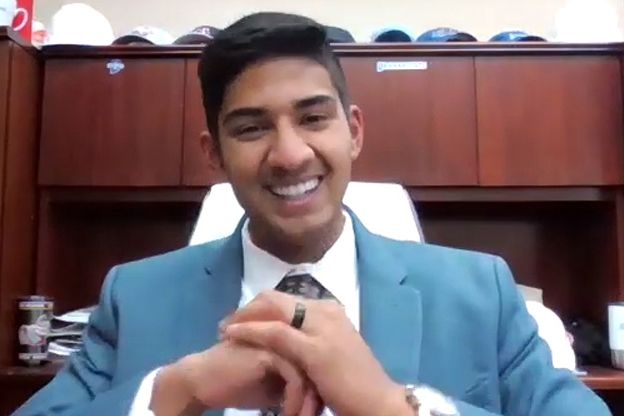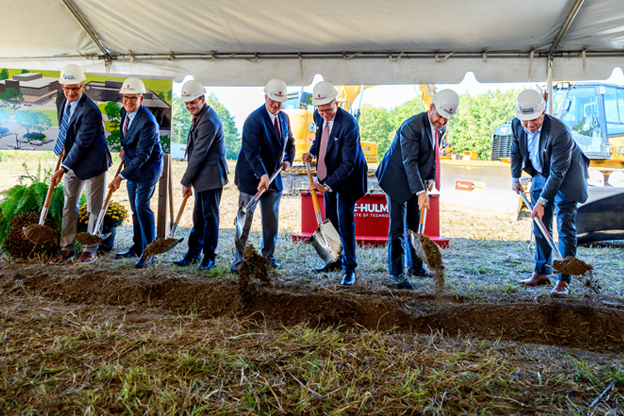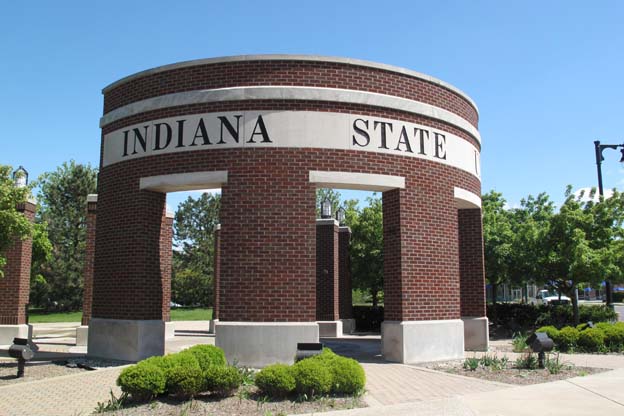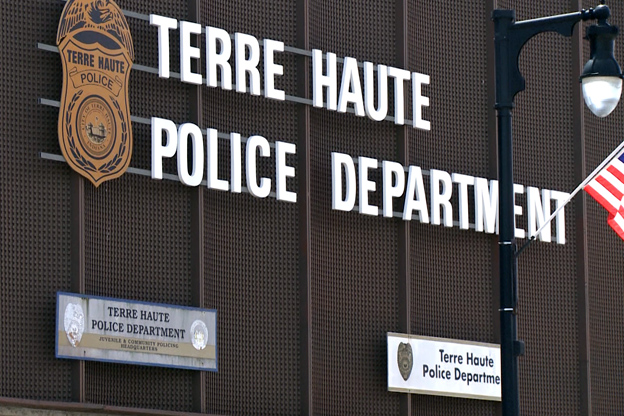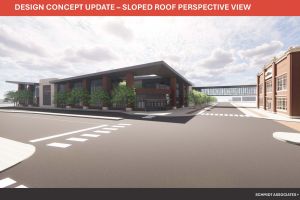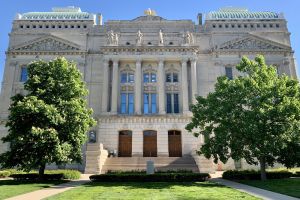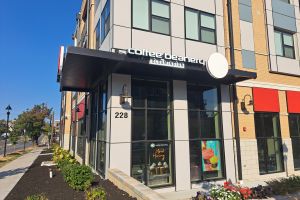Right. Hello and
Speaker 2
Welcome to ask the mayor on WFIU. I'm Joe Hren. This week we're in Terre Haute with Mayor Brandon Sakbun, hello, welcome. It is October. Can you believe it? Well,
Speaker 3
it goes by fast. And Joe, I really got to tell you, I just love NPR newscasters in those introductions. They're so smooth. One day, you and I should go on. This is all things considered on National Public Radio. I think we could do great with that intro.
Speaker 2
I love that you love that you've had a good broadcast voice too. So Well, I don't have a face for TV. That's her. Oh, stop, stop. Hey, you had some big news this past week. Terre Hautes, Rosemont, innovation, Grove, groundbreaking happened. I know you were there. So this is a new hub for innovation. Can you describe a little bit about what this is and how Terre Haute
Speaker 3
let's unpack this onion for a second, because someone else was there who is very important. That's Senator Todd Young. So Senator Todd Young helps author the chips act, right? The chips and science act. Reshoring American jobs is the headline. But there's also a lot of funding for Innovation Research, 3d printing, AI those conversations, and I think this project really encapsulates the positives of when we bring education into the picture when it comes to this innovation conversation. So is there a ton of chip back funding with this project? No, but this this project does show the positives of when we take something like medical technology and medical innovation. That's the Union Hospital piece to this project and a premier engineering school that's rose Holman Institute of Technology, we can get $100 million Innovation Center nestled in west central Indiana that advances the private sector and the educational sector within our community. Right now we have a project that's started construction. By the end of this project, students from rose home and Institute of Technology and the Vigo county school corporation can go study and learn about 3d printing, orthopedic surgery, hip replacements, and how all of those intersect with engineering, and then walk across a pedestrian sky bridge and literally see it in action. We already have companies reaching out to our two entities, Rose home and union, saying, hey, how do we get involved in this? This is one of those game changing projects that collaboratively brings together multiple industries within a community and helps turn the chapter forward in some business manufacturing within our community. Very impressive project.
Speaker 2
So the end goal, I mean, you're is these hubs are looking for also looking for small businesses to grow.
Speaker 3
So you want to see some small business growth. Yes, that should always be an initiative of these facilities. And then the second one too, is, how can you grow rose Holman and grow Union Hospital? Rose Holman, I don't know if you saw this on Indiana Business Journal. They're busting at the seams with enrollment, with programs. So you want to sustain that growth, and this is a way to do that, and you want to let Union Hospital continue to grow. And so we see two positives there,
Speaker 2
and there's so much to be said about the collaboration and networking, it's like a recipe for making something big, isn't it? It
Speaker 3
is. It is. I mean, you know, you can see some of the products and some of the conversations firsthand with the medical side, with this type of project, plus it's right by the airport. It's right by the 181st intelligence wing. What I would like to see is more defense technology innovation starts to sprinkle into Terre Haute, Indiana, right? We are one of two of the biggest air bases within the state of Indiana. Fort Wayne being number one, obviously. And I'm like, hey, look, we can compete with that, right? We have university research. We have a runway. We can bring in drone technology, other types of innovation that we see in the military side. And I'm like, that's something that we should really unpack as a Hoosier state, not just regionally. I think is it the state of Indiana has got to figure out how we can compete with the Michigan, the Ohio's the Colorado when it comes to national defense funding. You see a lot of companies go to Birmingham, Alabama. We can beat that here in the Hoosier State with projects like this.
Speaker 2
Speaking of collaborations, Indiana State University, the city of Terre Haute just announced a new partnership expands workforce development opportunities, but this is for city employees. So how does that work?
Speaker 3
This is so for me, I'm really passionate about all of our employees having opportunities for some employees, maybe working for the city of Terre Haute is not their entire career, and that's okay. This allows them to get an undergraduate or a master's degree or higher with a percentage discount for tuition and fees. So we partnered with Indiana State. We have two our employees right now are doing programs, one with IU, one with ISU, where they're advancing their educational career, they're getting some workforce experience, and if they spread their wings and fly, we want to set them up for a success plus, of course, we want to support Indiana State University. They've had two groundbreakings this year, their science and technology building, plus another large construction project. So they're investing in the community, and we're going to invest with them.
Speaker 2
I saw that you're coming up with a plan to remediate, clean up. There's a dilapidated site. I'm not familiar with this site, so I guess it's the Columbia enameling plant. Can you fill me in on that?
Speaker 3
a great question. And I really think it highlights how communities like Terre Haute have struggled over the last couple of decades. Is you saw some manufacturing leave the United States of America. Plants like this struggle, right? They inevitably closed down, and we had a quote, unquote developer try to come in and build some housing. So they said, and they ended up just creating a havoc on the site, and the buildings caved in on themselves. And we reached out to the EPA, to idem, reported, the site found out we were eligible for some cleanup funds, and so we're going to do a huge cleanup project, millions of dollars from the federal government reinvested back into the city of Terre Haute, and we're going to have a website, a town hall, to inform the public, let them know that it is still a safe area. We just need to get those contaminants out of the area. And I really think it highlights something that we talked about on the campaign. We really, really wanted to get some of these state and federal tax dollars back into the community, which here we have a great example of doing just that.
Speaker 2
So who owns that land? So
Speaker 3
it's listed under a holding company which was passed through for the demolition company. And, you know, there's a legal side to this that we are not involved in, but the EPA is involved in, of course, would we like site control? That is something we will try and pursue. And the focus right now, though, is clean up, get it back to Greenfield, get it back to a developmental project and then simultaneously pursuing site control.
Speaker 2
And you said, tests have not been done yet. Testing has been done. Yeah, has been done. And what have they found?
Speaker 3
There's some asbestos and some other chemicals that, you know, I'm forgetting the name off the top of my head. We'll be sure to issue a full press release to our surrounding media partners, as well as, as I said earlier, do that public town hall to inform them what exactly is in the ground and how we're going to take it out.
Speaker 2
It's been a while since I've asked about the former police station too, and what's going on with that building, older building downtown, of course, new police station down the street in the old former newspaper building.
Speaker 3
So I'm happy you asked that, because, as I mentioned towards the end of that last question, site control, right? Site control is really important in community redevelopment. We can enter into public, private partnerships with developers if we have site control. If not, it's just a private sector business conversation. Here is a great example of an old police station which we do have site control over. There was a bid in 2023 to redevelop that, and some financing fell apart in the business side, not the public sector side. Now we've got plans to completely demolish this site, provide a shovel ready site to developers, and we've seen a lot of interest. Our end goal is to do a multi use project. That's that fancy term. We're saying we want some apartments and we want some first floor retail and dining opportunities to add to our downtown. We're looking to see a private sector investment of 10 to $15 million in our downtown area, which would bring our total Downtown Investment to 60 to $80 million total for a town of 60,000 and so much of that is private funding. And we continue to attract private developers to the community of Terre Haute, Indiana.
Speaker 2
Now obviously I know the jail is is under the county. Have you heard anything more about the former jail?
Speaker 3
So that the former jail actually sits a stone's throw from my office. Depends on how good your arm is, right? You know, I'm not quite as athletic as I once was, but if I really warm up, I think I could hit it with a good sized rock. That is moving forward in terms of demolition. So the county has voted to demolish that building, and then they'll have another opportunity to redevelop as well. I love nothing more to kind of follow our our plan of public private partnerships. But ultimately, that decision rests with the county. Sure, sure. And
Speaker 2
you know, Monroe County is looking to build a new jail. The location has been so challenging. You know, jails don't seem to be built downtown anymore, and Terre Haute did that too a few years ago. Have you heard any feedback on how that's working? You know, with the courts being downtown and the jail being so far away,
Speaker 3
the transportation it's working, okay, but the Vigo county example is we've got a new jail, and the jail's full, so now we're looking to expand community corrections and dual diagnosis programs. What are those? Those are what someone classify as low level offenders. Here's an opportunity to get them back into the workforce if they need medical attention and medication that is provided to them in a community corrections setting. I think some simplistic ways to describe it is, it's a solid work release program. Currently they have room for 150 beds. Really it's 149 we are pursuing expanding and building a new facility that provides 300 beds. Every person that we put in this new program frees up space in our, quote, new jail, which is already overcrowded. To me, if we can take an individual, get them back into the workforce and get their life back on track and avoid incarcerating them. That's a common sense program that both political parties should pursue. A lot of times when we talk public safety and jailing in America, we face the symptoms of a problem, and that problem is we are not investing enough in public education, right? When you look at a community like Terre Haute, there is no charter school, right? This is why I get so fired up about public dollars going to private schools that aren't held to the same standard and aren't in our communities. Right? I support public education because if every kid could go to school fed, if every kid could have a strong education system, those jail numbers would reduce 15 years from now. And I get it. This is a long term conversation, but you know, the studies in the data clearly indicate that, why do prisons calculate their numbers of beds based off of second and third grade populations? Right? These are generational problems that we're facing, and we deal with the symptoms of the true problem, which is not investing in the youth as much as we should.
Speaker 2
I want to ask, because I see on X formally Twitter, every month, more and more housing like one by one, local builders turning a vacant lot into new homes. And it just sounds like could this be a model for other cities in the state of what you're doing there in Terre Haute?
Speaker 3
I certainly hope it becomes that I pitched it to our current state administration. I'll pitch it to the future state administration. Look, we took American rescue plan funds, and yes, it's true, some of our federal representatives did not vote for those funds, but we still received them. So we are going to put those funds to good use by providing a micro grant that allows local builders to apply for infrastructure funding. That's a fancy way of saying, Hey, if you're a builder, we can cover 10 to $15,000 of your cost, whether you're doing vacant lots and small development five to 10 or large neighborhood development of 15 to 25 homes. We also have a rehabilitation program for condemned houses as well. We house this under Thrive West Central Indiana, one of our strongest community partners. You know, the city of Terre Haute used to build 100 to 120 new homes, or new housing units a year, and we're going to hit 450 that's what we're on pace to do just this month with several months to go. And I know construction slows down as we get closer to the winter, but these are the types of numbers that we really want to hit our absorption rate, which is how economists kind of say, Hey, how are you building too fast? Right? That number is 650 they say if you hit 650 in a year, you're getting closer to capping out for your year. We're still underneath that. We've done some studies in west central Indiana needs about 5000 new homes over the next five years, especially with some of the companies coming to town. So when you look at transforming your local economy, we hit a little bit on education, right? But we also need to handle on housing. If we don't increase our housing stock or housing inventory, we can't shift that supply curve. There's a strong demand for housing, right? So we need to increase our total supply and slowly try to bring those houses down by adding more to the inventory. We've got one of the oldest housing stocks in the state of Indiana, and this is not going to happen overnight, and I recognize we've got interest rates, we've got a slew of federal problems and federal conversations as well, but from a local perspective, we're updating our building permits. We're updating our building inspection. We're aggressively tackling housing and adding homes back to the tax roll, which hopefully brings new families to Terre Haute and Vigo County, more kids in our school corporation. And there's the job piece of it as well, with some of the new companies, some of the current companies expanding, and some of the workforce development programs that we have. So housing is really one of those four pillars that all need to work together at the local level to grow your community. And I'm happy to say, you know, 10 months in, it's been a focus of the administration, and we continue to deliver for the people of Terre Haute, Indiana. There's
Speaker 2
something that came it's cut coming up in in Columbus, Bloomington has been dealing with annexation for years. Is that on your plate? Is that something you've thought about in Terre Haute?
Speaker 3
It is currently not on Terra hoods plate right now. And let me tell you why is communities started to battle with Americans buying more cars per household. You saw them start to expand out instead of up. We you just hit on this earlier. We're building homes in vacant lots. Right when you fill in the skeletal system of your city, you. We're not having to expand government services. We're talking police, we're talking fire, we're talking ambulance runs, Snowplow, street department, city engineering, sewage, plus your private utilities like gas, electricity and water. So to kind of alleviate that strain on your utility infrastructure, system and public safety, my mindset is, let's develop the land we have. Let's fill in some of these gaps. If they're if a conversation of annexation comes up within the community, of course, I'll work to address it. But right now, I say my mindset is, let's focus on what we have. Now. We don't need to expand out just yet, and I don't think it's a conversation we'll be having this year or next year
Speaker 2
before we go just any update on the budget, I know is this budget season. It is budget season,
Speaker 3
and we did have a budget increase in terms of our expenses. But what we're not doing is issuing any debt. Right? What we are doing is using some of the cash that we have on hand, specifically in our Sanitary District, to do projects within our quote, long term control plan, this is the EPA saying you've got to separate stormwater and wastewater. We've known about these mandates for years, and we haven't been as aggressive. So my mindset is, let's use some of the cash in the bank now to update our stormwater, to update our sewage system, and not to mention within our edit fund, economic development income tax fund. We have a couple of large projects that were really kicking off and some bills that simply are coming due from previous decisions. So that's why you saw a pretty big increase in our city's budget. It's a 12% increase when it comes to spending, right? And our revenues are not growing by 12% but what we're not doing is issuing any debt or using funds that we already have to pay for some of these projects. I'm very important in stating that we're not doing any tax increases. Right? We are increasing some of our optional fees, like building permits, but we are not going to do a tax increase which we're proud of.
Speaker 2
And hearing the first hearing has been done, right? The
Speaker 3
first hearing has been done. And then October 10, the budget goes to Council to pass.
Speaker 2
Right, right. Okay, okay. Before we go, I have to mention, too, you have a new title. It's called dad. It is congratulations.
Speaker 3
Thank you, Joe, thank you so my wife, Peyton and I are blessed. We welcome our our baby girl, Scarlet, into the world. She's doing great mom covering, and it's just been a true blessing. I don't get to change her as much. I do change her diapers a lot, but some of her outfits, I quickly got told my fashion sense wasn't quite there, but I am happy to be a dad. Been looking forward to this for a long time.
Speaker 2
Yes, well, thank you so much for doing this show. I do like to leave the very last minute, though, to you. Do you have any other things that we should know about, any announcements? You
Speaker 3
know, I think truthfully, at the end of the day, we're trying to transform the city of Terre Haute, right? A lot of that is partnerships. We're partnering with the school corporation to do an education grant for teachers to overhaul their classroom space with some casino tax dollars, we're working on investing our parks and adding to programming so our kids during the summer months and when they're not in school have programs to do in our local parks. We face a lot of the symptoms of national and international problems, but what we are going to do is get down on our luck, and we're always going to look for opportunities to improve. And I would say 10 months in, I think we're doing as much as we can.
Unknown Speaker
Mr. Mayor, thank you so much, and hope to see you next month.
Unknown Speaker
Hope to see you next month. Thank you, Joe. You.







